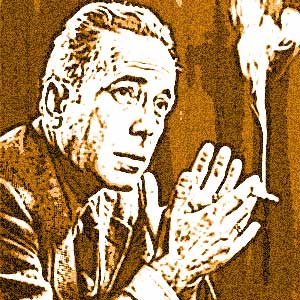The past decade or so has proved lucrative for reality show producers. Do you think the media has reached this point—that of invading a home to film an overweight toddler? Or has it already crossed this line?
I think the idea of crossing the line is interesting. In my mind, though, media hasn’t crossed any line that it hasn’t crossed before. What captures my attention on this issue is the idea that some people volunteer to reveal their lives to the world while others don’t. I’m always trying to understand why people do things. I pester everyone I meet with question after question. So, I was curious to try and figure out why someone who wasn’t an exhibitionist would end up opening their house up to a show like this. And, I asked myself if this mother was truly upset or if she was somehow relieved that her life would now be opened up for everyone to see.
This passage of dialogue serves dual purpose:
“When did your husband leave you?” the director asked.
“Six months ago. No, a year now.”
“And, when did Elliot start to gain the weight?”
“Those things aren’t connected…”
On the one hand, the dialogue helps explain why the mother would allow a film crew inside of her house. She is a single mother. She needs help for her son. But, I think, it also chalks one up for the bad guys, so to speak. The father left the mother; her son subsequently gained weight. The crew is finger-pointing in the worst way. How important is it to create this type of tension in fiction, or any other medium?
This particular passage was very important to me because it gives history to the family and personality to the crew. It creates the rest of time that the actual events of the story are embedded in. With this piece, I didn’t want to have a flashback or anything like that, so this dialog served the purpose of rounding out the story. Tension is something I’m still trying to understand. It’s very important for all stories to have tension, but tension can come in so many forms. It can be mystery; it can be fear; it can be the lack of information; it can be linguistic. I don’t have a solid grasp on it, so it’s something I still need to learn.
Why is this story important?
Hmmm…this story is important because it’s art, and art’s important. Honestly, I think it’s hard to say that a particular piece is important. All stories are important because they open up a fraction of a life or lives for other people to sympathize with.
You’re working on a novel that takes place in Thailand. Can you tell us any more about it? Have you traveled to Thailand?
I’ve been to Thailand three times in my life, and one of those times was to witness the cremation of my well-respected grandfather. The ceremony was an intense three-day ordeal with dancers and musicians and chefs, and even though this was years ago, many of the events of that ceremony still remain with me. This cremation became the background of the novel I’m writing because I was interested in how Thai people show their respect to the dead. At the same time, I had also heard about an uncle of mine who passed away. What was interesting about this man was that a lot of people didn’t seem to like him very much, and yet all of their lives were intertwined with his. So, I asked myself, what would happen if this man had been the center of such a large and complicated ceremony? What secrets would be revealed? Would his family respect him, or would the result be a ceremony that was done out of duty rather than out of love? That’s what I decided to investigate in this novel.
Since this is my first issue with SLQ, I thought it’d be appropriate to discuss firsts. Writing firsts. First time you called yourself a writer, first publication, first check. Those sorts of things. So, dish. What is your most memorable writing first?
During my senior year in high school, I ended up with an English teacher that no one liked. She never finished her sentences and always left her students wondering what point she was trying to make. On one assignment, she told us to write about our city of Arcadia, California in the style of Flaubert. We were all about to graduate, and I was trying to make the hard decision of whether I should go away to college or stay closer to home. I was at a point in my life where I was craving change, so when I started to write about my city, a lot of critical but very honest thoughts poured out of me. It was the first honest thing I had ever written. After we all turned our assignments in, my teacher said that she wanted to read one of them out loud. She chose mine. When she read it, I could feel the approval from my classmates, and true to her habit of keeping her students confused, she said “There’s something about this. There’s just something about this.” For the first time, I understood the power of writing sincerely and speaking from my heart.



 The core workshop of SmokeLong Fitness is all in writing, so you can take part from anywhere at anytime. We are excited about creating a supportive, consistent and structured environment for flash writers to work on their craft in a community. We are thrilled and proud to say that our workshop participants have won, placed, or been listed in every major flash competition. Community works.
The core workshop of SmokeLong Fitness is all in writing, so you can take part from anywhere at anytime. We are excited about creating a supportive, consistent and structured environment for flash writers to work on their craft in a community. We are thrilled and proud to say that our workshop participants have won, placed, or been listed in every major flash competition. Community works.